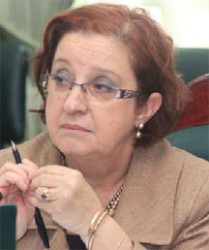The parliamentary select committee on the stalled anti-money laundering amendment bill is not likely to meet again before October 10th, 14 days before Guyana is to undergo an international review of its legislative shortcomings considered by the Financial Action Task Force (FATF).
This is according to the committee’s Chairperson Gail Teixeira, who says she has failed to convince members of A Partnership for National Unity (APNU) and the Alliance for Change (AFC) to meet to consider the bill before the National Assembly’s annual recess. The opposition, however, is saying that government is to blame for delays in moving the committee’s work forward as it refuses to demonstrate the will needed.
APNU MP and committee member Joseph Harmon says the ball is in government’s court and added that it must now determine how to move forward. Stabroek News asked Harmon if APNU plans to push for meetings during the recess and he said government is not exhibiting any signs that such meetings would see progress. He said that government is aware of the opposition’s terms and has demonstrated time and time again that its inability to compromise.

APNU says it will support the bill once President Donald Ramotar assents to several opposition bills he has vetoed, while the AFC requires the setting up of the Public Procurement Commission (PPC) before it votes to pass the bill. The inability of the three sides to come to an agreement has seen Guyana miss three deadlines and slapped with what amounts to blacklisting on two occasions. On the last occasion, in June, the Caribbean Financial Action Task Force (CFATF), which has been working with Guyana to help overhaul its legislation, referred the country to FATF.
Teixeira says she tried on several occasions to convene meetings in the last two months to no avail. She reportedly asked members of the opposition to make themselves available for a meeting before July 10 and again on July 18th. Both offers were refused, she explained, as the opposition members reportedly said they would be otherwise occupied. Preparations for the PNCR’s 18th Congress, which ran from July 25 to July 27, was one of the excuses offered, she elaborated.

Teixeira says she also tried for meetings at the end of July but this did not happen as the opposition parties again said they could not make it. She said a representative from APNU eventually informed her that neither the coalition, nor the AFC would be able to meet until after the recess in October. Teixeira says she will therefore try to convene a meeting on the very day the recess breaks. Attorney General Anil Nandlall has said that during this time government will be moving to strengthen non-legislative aspects of Guyana’s anti-money laundering regime.
Also, in the interim, FATF will be executing a targeted review of Guyana’s Anti-Money Laundering and Countering the Financing of Terrorism (AML/CFT) infrastructure and government has committed itself to rendering whatever assistance is needed to complete the process.
On July 9th, FATF Co-Chairs Daniel Glaser and Guiseppe Maresca wrote the government, indicating that during the body’s June Plenary it decided that “Guyana should be subject to further review with respect to its compliance with the international standards for AML/CFT.”
Glaser and Maresca said the decision is a follow up of the “referral made by the Chair of the Caribbean Financial Action Task Force (CFATF) received on 10 June 2014.” The Co-Chairs added, “the nomination was based on the lack of progress in addressing strategic deficiencies in Guyana’s AML/CFT regime, which resulted in a series of public statements issued by the CFATF, most recently on 29 May 2014.”
They acknowledged a letter by Ramotar, sent to the body on June 19th, as well as the Teixeira’s presence during the June Plenary and informed government that “a targeted review of your jurisdiction will be undertaken prior to the October 2014 FATF Plenary meeting.”
Glaser and Maresca further explained that “the purpose of the targeted review will be to examine the most significant deficiencies in your AML/CFT framework that pose a risk to the international financial system, as well as to identify steps that should be taken to address those deficiencies through the development of an Action Plan.”
The review, FATF says, will be conducted by the Americas Regional Review Group (ARRG) of the International Cooperation Review Group (ICRG), co-chaired by Darlene Boileau of Canada and Ms. Maria Fernanda Garcia-Yrigoyen Maúrtua of Peru. Glaser and Maresca requested government’s “full cooperation in assisting the ARRG to conduct its work, including by providing up-to-date information related to AML and CFT issues as requested by the ARRG co-chairs.”
“Furthermore, you will be given an opportunity to review the draft targeted review and to have a face-to-face meeting with the ARRG,” the letter said.
When the Action Plan is finalized, FATF will request written confirmation of government’s “(high-level) political commitment to fully address the identified strategic deficiencies including by implementing the Action Plan within” set out timelines. The results of the review will be deliberated during FATF’s Plenary in October.” Nandlall responded to the co-chairs on July 9th, assuring them of “government’s fullest and most unbridled cooperation in assisting the ARRG in the conduct of its work and the discharge of its functional responsibilities.”
He also took the opportunity lay the blame for the non-passage of the amendment bill at the feet of the opposition parties. “Unfortunately, the government’s efforts to accomplish this objective have been and continue to be thwarted and frustrated by a Legislature in which the joint opposition parties enjoy a majority vote… I remain hopeful for a fruitful and magnanimous engagement,” he wrote.




